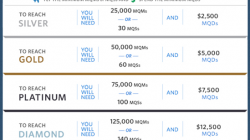For the last seven years, every time I’ve booked a flight I’ve calculated the CPM (Cents/Cost Per Mile). This is the amount I spend divided by the distance I fly — more specifically the number of elite qualifying miles (EQMs) that I earn. Why? Because they determine my progress toward earning elite status, which promises benefits like priority customer service, fee waivers, and space-available upgrades.
Some people calculate CPM using a different measure, like the number of redeemable miles for future award travel. But the number of EQMs is more consistent between individuals of different elite tiers, and EQMs often matter more.
This year we have a new measure: elite qualifying dollars abbreviated as PQDs for United Airlines customers and MQDs for Delta Air Lines customers. These two carriers require you to earn your miles as well as spend a certain amount of money on those tickets. With a few important exceptions, you can’t just skate by on cheap fares anymore.
A recent conversation with another United Premier 1K and a thread on FlyerTalk started by raehl311 got me thinking: Could it be a good thing that we now have to track elite qualifying dollars? Not necessarily a great thing, but better than what used to be.
Chasing EQMs Is Not Fun
Earlier this year I booked a one-way ticket from Seattle to Chicago. Lots of non-stop options were available for $120. At a distance of 1,721 miles, the CPM was 6.97 ($0.0697). Not awful for a non-stop route, but not particularly great. A low CPM means I’m probably going to have to go out of my way on a future trip or even book a mileage run in order to bring down my average CPM for the year.
What else could I do? Routing from Seattle to Dallas to Chicago would cost only $131. Sometimes connections save money and sometimes they cost money. This one is the latter. But I would earn 2,462 miles and bring my CPM down to 5.32. That’s a big improvement. I consider 5 CPM pretty good for mandatory travel when I don’t have much say about the dates or destination.
The problem is that routing via Dallas makes the schedule far less convenient. A non-stop option departs Seattle at noon, meaning I can clean the apartment after Megan leaves for work, get some blogging done, and then take a leisurely train ride to the airport. I would arrive in Chicago around 6 PM. But a connecting flight would require an early wake-up call for a 6 or 7 AM departure and have me landing in Chicago at the beginning of rush hour. This is not fun when you’re a traveller with a suitcase on a crowded subway.
So are the extra 741 miles worth the inconvenience? Is it worth it to bring down that CPM? To ensure that my running average for 2014 remains as low as possible? So that when I get to September I don’t freak out that I’ve blown my budget for the year and need to start booking even more absurd routings to save money while earning more miles?
Playing with Customers’ Psychology
By introducing elite qualifying dollars, two carriers have created a release valve for this insanity. If I worry that I’m paying too much for my flight, that my CPM is too high, I can take comfort that I will earn lots of elite qualifying dollars to make up for the other flights where that CPM is low. In fact, CPM would barely matter at all in my thought process if I were still flying United. Anyone can earn lots and lots of miles by paying through the nose for some crazy routings. And if you’re paying a lot and still not earning enough on the PQM side, well, United has you covered.
The message this year from United and Delta to their customers is they need to spend on average 10 CPM for elite qualifying miles, plus extra for government taxes and fees. That gives them the freedom to book nonstop flights, convenient times, maybe even the occasional discounted first class.
It certainly reduces the sting of having to book a higher W fare to redeem Global Premier Upgrades on United and, now that I think about it, makes a strange sort of sense that Delta would pick this time to reduce its own ludicrous fare restrictions for redeeming upgrades. Did Delta decide that with elite qualifying dollars it no longer mattered how much customers paid for an individual ticket? That it would earn enough revenue from each customer over the entire year so that it could, in turn, give those customers more freedom to use their upgrades? It’s an interesting thought. Maybe United will make a similarly #FlyerFriendly rule change.
…But who am I kidding. 😉
Summary
Elite qualifying dollars may not be the final solution, as I hinted at the beginning of this post. They are a crude way to measure a customer’s profitability to the airline since even expensive fares may have narrow margins if the cost of providing that service is high enough.
But they have the advantage of reducing perverse incentives that encourage routings and connections that probably make it harder to operate an airline. I’m sure United and Delta would love it if more of us flew nonstop so we didn’t get stranded in Denver or Salt Lake City. They might also receive fewer customer complaints if we’re paying for the service we want rather than the cheapest we can get.
Topic for a future post: Could there be an even better way to award elite status, and — more interesting — has that mechanism already been developed, waiting to gain more widespread adoption?

